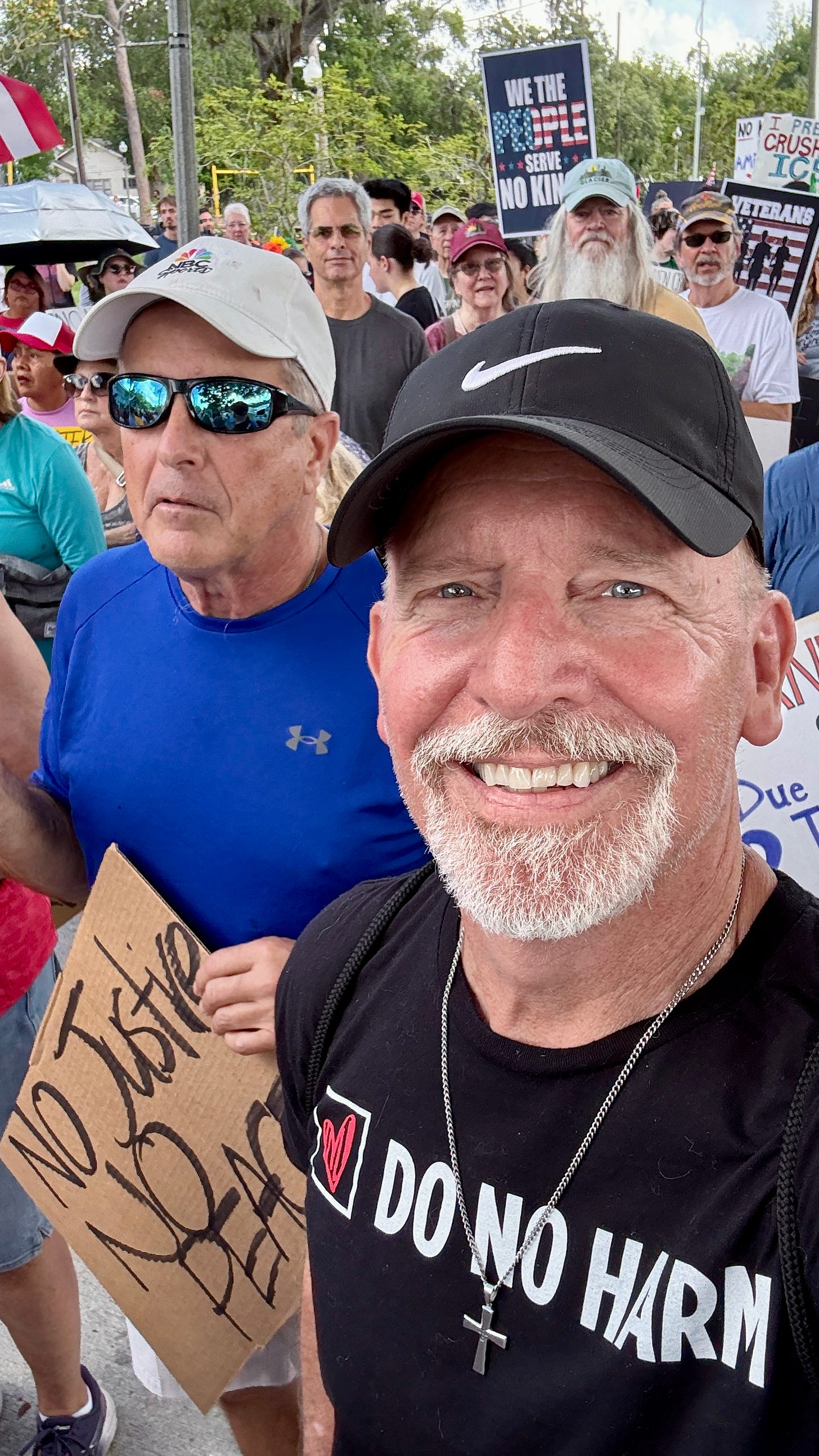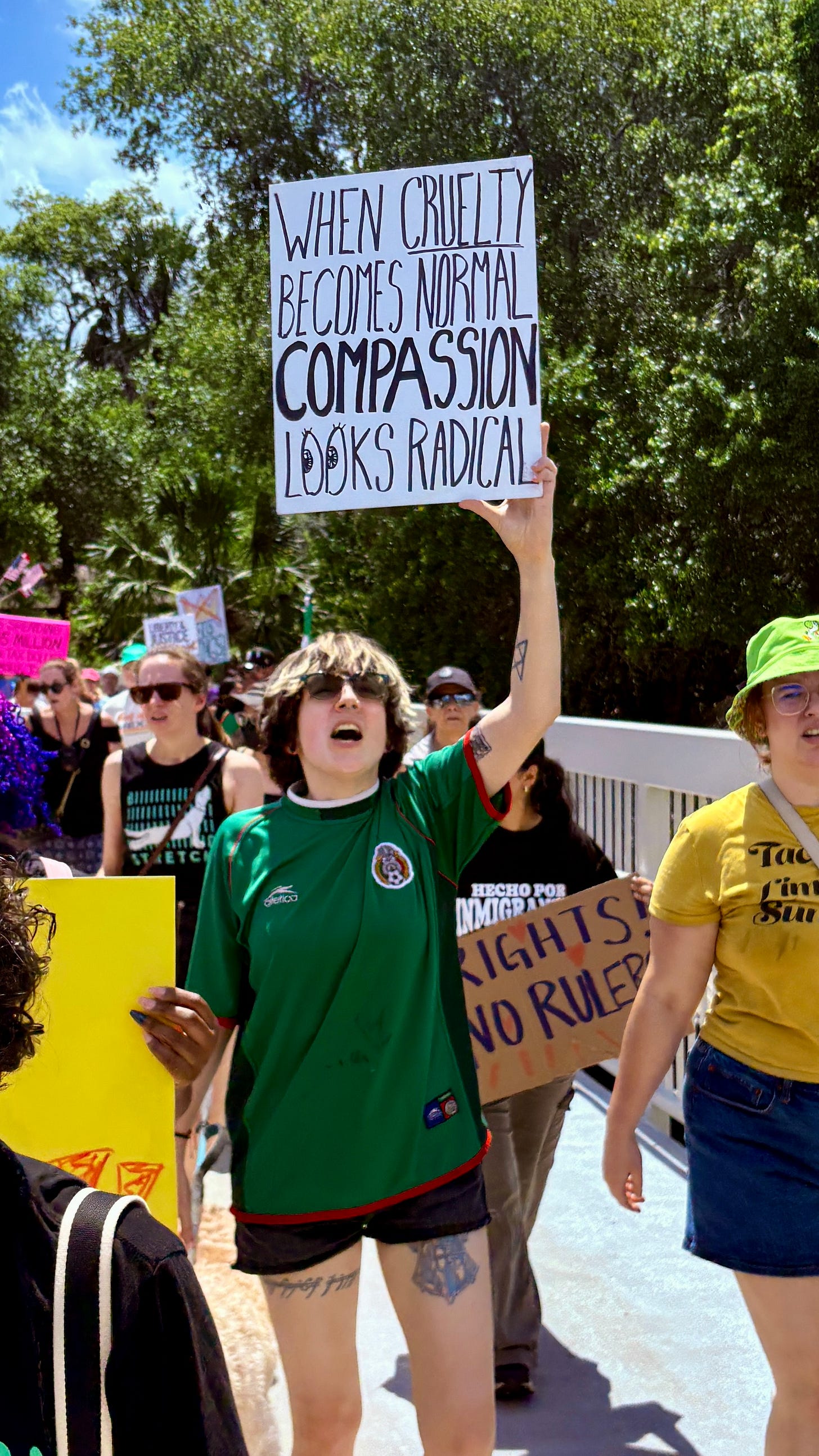"If anyone boasts, 'I love God,' and goes right on hating his brother or sister, thinking nothing of it, he is a liar. If he won't love the person he can see, how can he love the God he can't see? The command we have from Christ is blunt: Loving God includes loving people. You've got to love both." - 1 John 4:20 MSG
Saturday, I found myself in Apopka, Florida, holding a sign and participating in "No Kings Day"—something I honestly never thought I'd do. If you'd told me a few years ago that I'd be standing on a street corner with a protest sign, I would have laughed. But here I am at 67, and I'm not there because of politics. I'm there because I couldn't shake a simple question that's been keeping me up at night:
"What would Jesus do if He were me?"
I've lived through enough presidents and political battles to know that when all the shouting dies down, what really matters isn't who "won" but how we treated each other along the way. And lately, I've been wrestling with something uncomfortable—this growing tension between what I see happening around me and what I read about Jesus in the Gospels. It's been eating at me, honestly.
The Company Jesus Kept
When I think about wearing my "Do No Harm" shirt Saturday, I can't help but think about the people Jesus chose to hang out with—and how much it ticked off the religious folks of His day.
I mean, Jesus was literally called a "friend of tax collectors and sinners" (Matthew 11:19), and that wasn't meant as a compliment. These weren't just unpopular people—tax collectors like Matthew and Zacchaeus were seen as traitors and thieves by everyone else. The religious leaders wouldn't be caught dead at their dinner tables. But Jesus? He not only ate with them, He invited them to follow Him.
And it wasn't just tax collectors. Jesus touched lepers—something that would make Him ritually "unclean" in the eyes of the religious authorities (Matthew 8:1-4). He stuck up for a woman about to be stoned for adultery when the religious leaders were ready with rocks (John 8:1-11). He had this amazing conversation with a Samaritan woman at a well—breaking about three social rules at once (John 4). When His own disciples tried to shoo away some kids, Jesus basically said, "Are you kidding me? Let them come!" (Matthew 19:14).
You see the pattern, right? Jesus kept choosing to stand with the people the religious establishment had written off.
When Compassion Looks Radical
One of the signs I saw on Saturday really got to me: "When cruelty becomes normal, compassion looks radical." It made me think about how the religious leaders must have seen Jesus' compassion as dangerously radical. He was messing with their neat little categories of who was "in" and who was "out."
Here's what's been bothering me: I wonder if we've become more comfortable being like those religious leaders than like Jesus.
When I hear immigrants called "vermin," when I watch families get torn apart, when I see people treated like they're less than human—something in my gut tells me this isn't right. But then I look around and see so many of my fellow Christians either cheering it on or staying silent, and I think, "Wait, what am I missing here?"
Jesus said He came "not to call the righteous but sinners to repentance" (Luke 5:32). His love was radical because it didn't matter what everyone else thought about somebody—He saw their worth anyway.
This Is Not a Left or Right Moment
Another sign that stopped me in my tracks read: "This is not a left or right moment, it is a right or wrong moment." And honestly, that's exactly how I feel.
Look, I know some of you are probably thinking I've lost my mind or gone all "woke" or whatever. But hear me out. As Christians, isn't our first loyalty supposed to be to Jesus, not to any political party or leader?
If we're really trying to follow Him, shouldn't the way we treat people—especially the most vulnerable people—look something like the way He treated people?
I'm learning that my "Do No Harm" shirt means more than not doing something to hurt someone. It also means not allowing my inactions to contribute to hurting someone. Sometimes it means I need to speak up when I see "the least of these" (Matthew 25:40) getting trampled on. John Wesley didn't stay quiet about slavery, even when it was unpopular. Sometimes staying silent while people get hurt is its own kind of harm.
The Ground Is Level
Here's what I keep coming back to: the ground at the foot of the cross is level. Every single person—no matter where they come from, no matter what they've done, no matter how different they are from me—has been created in God's image. They've got God's thumbprint on them, just like you and I do. That alone means they deserve to be treated with basic human dignity.
Now, that doesn't mean we don't hold people accountable when they do wrong things. Of course we do. But there's a difference between accountability and cruelty, between justice and dehumanization.
As Pastor Benjamin Cremer reminds us:
"The church has always been at its best when it stands with the crucified, not the crucifiers. In the face of the empire, the early Christians were known not for defending their privileges, but for caring for the poor, welcoming the stranger, and loving even their enemies. May we, too, have the courage to live as citizens of the kingdom of God—a kingdom where the last are first, the meek inherit the earth, and no Caesar gets our loyalty, only Christ.
Christ is King.
Which means no one else is.
Let us live accordingly."
The Question Before Us
So there I was Saturday in Apopka, holding my "No Kings" sign, wearing my "Do No Harm" shirt, feeling a little awkward if I'm being honest. I wasn't trying to make some big political statement. I was just trying to wrestle with a question that's been haunting me:
Who would Jesus stand with?
And when I look at the Gospels, the answer seems pretty clear. Jesus stood with the people everybody else had given up on—tax collectors and prostitutes, lepers and outcasts, foreigners and forgotten kids. He made himself "unclean" by touching people others wouldn't touch. He gave dignity to people society had thrown away.
So here's what I'm wondering: Are we known as people who do the same thing? When someone looks at how we Christians treat others, do they see Jesus' radical love, or do they see something else?
I'm not asking you to agree with me on every political issue—honestly, I'm still figuring a lot of this out myself. What I'm asking is whether our lives actually reflect the love of the person we say we're following.
In a world where being cruel has somehow become normal, maybe it's time for us to let our compassion look a little radical again. Maybe it's time to ask ourselves not just "What would Jesus do?" but "Who would Jesus stand with?"—and then find the guts to stand there too.
Because at the end of the day, the command from Christ is pretty straightforward: "Loving God includes loving people. You've got to love both."
Mike







Open Letter to Mr. Michael and the Family of Faith at First Orlando Baptist Church
June 16, 2025
Dear Brother Michael and beloved brothers and sisters in Christ Jesus,
Grace and peace to you in the name of our Lord and Savior, Jesus Christ.
I write today not out of bitterness or anger, but with a troubled heart and a prayerful spirit. Having witnessed the current state of affairs in our nation—and more painfully, within the body of Christ—I feel compelled by the Holy Spirit to speak what is burning within me. I cannot remain silent while the name of Jesus is invoked to justify policies, postures, and political allegiances that directly contradict His teachings.
Brother Michael, your message, "Who Would Jesus Stand With?", pierced me deeply. I commend your courage in wrestling with that question, standing in Apopka with a sign of compassion rather than a banner of condemnation. Yet as I sat among fellow believers in our sanctuary—some of whom once fervently promoted a political candidate now seated in the Oval Office—I couldn’t ignore the disparity between our public witness and the private pain caused by the very policies many among us helped elevate.
Where was our spiritual discernment when families were torn apart at the border?
Where were our pulpits when cruelty was normalized as leadership?
Why did the church grow so comfortable defending power while ignoring the pain of the powerless?
Jesus made His position unmistakably clear:
He stood with the outcasts. He touched the untouchables. He defended the voiceless.
He rebuked religious leaders who used Scripture to protect their own influence.
And He refused to let political expediency pollute the purity of His mission.
I fear that in our silence—and in some cases, our celebration—we, the Church, have betrayed our prophetic role.
We cannot both claim to be followers of Christ and remain aligned with systems and spirits that dehumanize immigrants, ridicule the poor, and weaponize fear against the marginalized. To do so is to confess Jesus with our lips and deny Him with our politics.
Some of our leaders now post online in protest of what’s happening today—yet these same voices encouraged us from the pulpit to support the very leadership that now enacts these unjust practices. While repentance is always welcomed, accountability is required. To march now without confessing the harm done yesterday is spiritual hypocrisy.
The Scriptures tell us plainly:
“If anyone boasts, ‘I love God,’ and goes right on hating his brother or sister, thinking nothing of it, he is a liar…” —1 John 4:20 (MSG)
“Judgment must begin at the house of God.” —1 Peter 4:17 (KJV)
So let us be honest. Let us be humbled. Let us ask ourselves not just “What would Jesus do?” but “Who would Jesus stand with?”—and then find the courage to stand there too.
It is time for the Church to stop walking in complicity and start weeping in repentance. Before we protest with the world, we must repent within the household of faith.
✝️ A Final Prayer
Lord,
Break our allegiance to anything that competes with You.
Cleanse our pulpits of compromise.
Restore to us a holy boldness to speak truth, love radically, and follow Jesus,
even when it costs us comfort or community.
Let us remember that Christ is King—no one else is.
Amen.
With love and concern in Christ Jesus,
Javier Cruz
A servant of Christ,
A witness to truth,
A member of the body, praying for revival.
Mike, thank you for putting this so clearly. There are so many recent events that I am not in agreement with and I have to stand back and ask , how are we allowing this to happen? Why are people not seeing the truth?
I love what you said with compassion is considered being radical now. Yes, Jesus was radically compassionate , loving and wise.
It’s a great reminder to be strong and courageous in standing up for what is true and righteous.
May God bless us all , our country and the rest of the world.